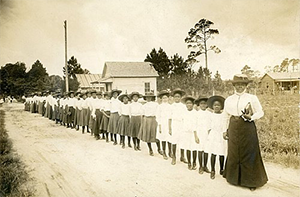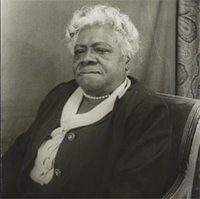Mary McLeod Bethune: Civil Rights Activist, Educator
Mary McLeod Bethune was a civil rights pioneer, speaking out against discrimination and paving the way for African-Americans to get a better education. She was born on July 10, 1875, in Mayesville, S.C. She was the 15th of 17 children born to Samuel and Patsy McLeod, both former slaves. Much of the family picked cotton in order to survive. Mary started pulling her weight when she was 5; by the time she was 9, she could pick 250 pounds of cotton a day. Young Mary was the only one of her siblings to go to school. She walked five miles each way each day to attend Trinity Mission School, run by Christian missionaries to help educate African-American children. Her teacher, Emma Wilson, mentored Mary throughout her life. A good student, Mary earned a scholarship to the Scotia Seminary, a Concord, N.C., girls school, and began attending the school in 1888; she graduated in 1893. Her next stop in her education journey was the Moody Bible Institute, in Chicago. After finishing two years of study there, she returned to the South and began teaching at Haines Normal and Industrial Institute, in Augusta. Ga. She married Albertus Bethune, another teacher, in 1898. Their son, Albert, was born the following year. The Bethunes moved to Savanna, Ga., and then to Palatka, Fla. Mary and Albertus separated in 1907. 
In 1904, Mary founded the Daytona Normal and Industrial Institute for Negro Girls in Daytona, Fla., with very little money and using recycled materials. The first class in the small rented house was five girls ages 6 to 12 and her son, then 6. She was the president of the school for many years, including after it merged with the Cookman Institute for Men, in 1931; by that time, the student roll included hundreds of names. This then became Bethune-Cookman College, one of the few places in the United States that at that time admitted African-American students. Bethune left the college in 1942. In 1911, Bethune founded a hospital, using charitable donations to purchase a cabin near her school. Both Black and White doctors worked at the hospital, which operated for two decades. Staff at the hospital gained special recognition for their efforts treating patients during the 1918 outbreak of the Spanish Flu. 
Also active in the drive for civil rights, Bethune was head of the Florida branch of the National Association of Colored Women; she achieved leadership of the national organization in 1924. She served as an advisor to a handful of U.S. Presidents, including Calvin Coolidge, Herbert Hoover, Franklin D. Roosevelt, and Harry Truman. She served in various capacities, including on a committee on child health. In 1935, Roosevelt named her a special advisor; in that same year, she started the National Council of Negro Women. The following year, Roosevelt named her director of the Division of Negro Affairs of the National Youth Administration. She was instrumental in the creation of the Federal Council on Colored Affairs, known colloquially as the Black Cabinet, and helped set up the first officer candidate schools for African-American women, lobbying Roosevelt to admit them for service. She also became a friend of and advisor to First Lady Eleanor Roosevelt. Bethune in 1940 was named vice-president of the National Association for the Advancement of Colored Persons (NAACP); she remained in that post for the rest of her life. In 1944, she cofounded the United Negro College Fund (with Frederick D. Patterson and William J. Trent). In 1945, Bethune attended a conference regarding the founding of the United Nations; she was the only African-American woman in attendance. A few years after that, Truman appointed her to represent the U.S. Government at a presidential inauguration in Liberia. Bethune for many years wrote for the newspapers the Chicago Defender and the Pittsburgh Courier. She also was a cofounder of a life insurance company. Eventually retiring from public life, Bethune returned to Florida. She died of a heart attack in Daytona, on May 18, 1955; she was 75. She left behind a collection of writings, "My Last Will and Testament," that included elements of self-reflection. |
|
Social Studies for Kids
copyright 2002–2026
David White




